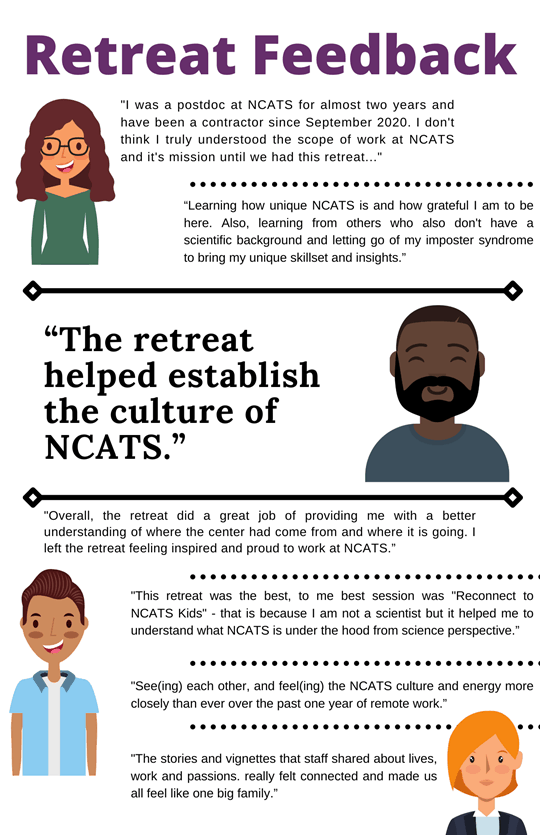Workplace Visioning Retreat

Virtual Retreat Provides Opportunity for Staff to Reconnect, Reimagine, and Renew
A team including Evans Senior Consultant Jessica Sussman worked with the National Center for Advancing Translational Science (NCATS) within the National Institutes of Health to create an all-team visioning retreat following a year of mostly virtual work.

Background
After a year of telework and the isolation experienced through the pandemic, the people of NCATS expressed a desire to reconnect with their colleagues and as a greater community. As the workforce has been working nearly entirely virtually for the last year, there are many plaguing questions about what the future workspace, workplace and work dynamics will be. We also heard from NCATS staff that the push to work towards developing a vaccine for COVID-19 has left many people feeling “burnt-out” with a need to recharge.

The Challenge
NCATS identified a need for a center-wide retreat to vision the future of the workplace following a year of virtual work during the COVID-19 pandemic while still being virtual.

The Solution
Using a collaborative design approach with the NCATS staff, a virtual retreat with general sessions and breakouts was planned to focus on three core themes: Reconnect, Reimagine, and Renew. Participants were given the ability to choose which breakout sessions they would attend, as they would when attending a traditional on-location conference, creating a “Choose Your Own Adventure” feel.

The Approach
The retreat’s purpose was defined to create an experience for diverse staff to reconnect with each other and with the NCATS mission, reimagine the future and way the community goes about its work, and renew both individual and whole group passion for the work of translational science.
The retreat was designed with several core stakeholder groups working together. The combination of the following approaches cannot be overemphasized enough in the success of this retreat. No singular approach would have facilitated the success of the retreat the way the combination of approaches did. The most important aspect of each of these methodologies to the retreat design approach is listed below:
Traditional Project Management
- This retreat had a tight timeline in which it needed to be developed and executed. The team broke down the timeline per month with specific accomplishments that needed to be met.
Agile Management
- The Executive Retreat Sponsors came to the external consultants with a draft agenda. The team utilized this input as a solid foundation and began to iterate on the agenda. This aspect of iteration allowed for the agenda to provide an inclusive and meaningful experience for the retreat attendees.
- Using Scrum methodology, stakeholders met every two weeks for regular 15-minute check-ins to review what has been done and what needs to be done kept the project moving forward on logistical matters that were separate, however, just as a critical as the session design work.
Human-Centered Design
- Human-Centered Design advocates for the inclusion of curiosity, creativity, and empathy to meet business objectives. Using Design Thinking, the retreat designers first made sure they had a clear definition and scope of the project. To enable this, the retreat sponsors allowed the external consultants to spend nearly six weeks truly understanding the business needs of NCATS. A staff-advisory group was put together to provide an opportunity for the retreat designers to solicit creativity and ideas from staff, test agenda ideas, and collect candid feedback that might not ordinarily be shared with those in their leadership hierarchy.

Outcomes Achieved
This retreat served to set the stage for strategic planning and innovative progress by reconnecting and renewing the focus on each other and the audacious work that NCATS can accomplish. The next steps following the retreat include intentional strategic planning that is inclusive of diverse perspective and ultimately provides a clear path of the key directives and business goals to accomplish over the next 2-5 years.
Approximately 73% of retreat participants responded to a post-retreat survey and collectively rated the retreat overall as 4.65 out of a possible 5 points, where a rating of 5 denoted “excellent” and a rating of 4 denoted “above average.”
Notably, the feedback showed the critical importance of fostering personal connections in all aspects of the retreat.






